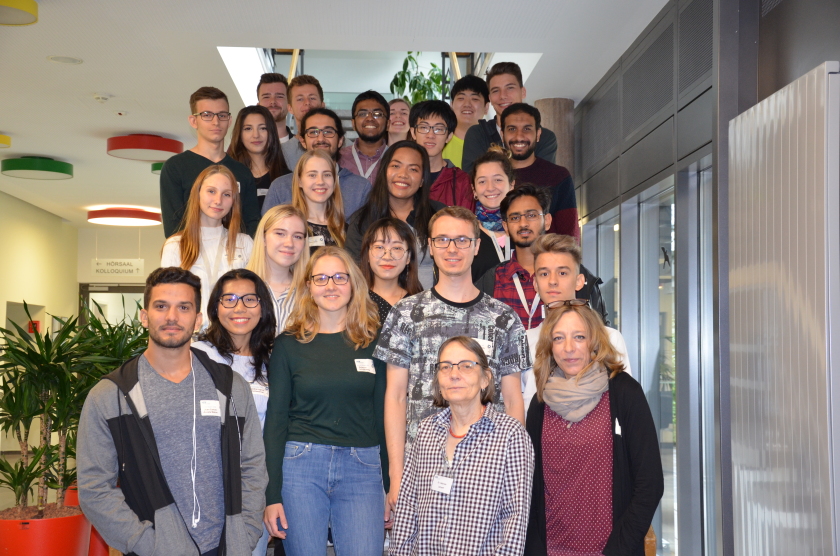Summer in the laboratory: 24 students from all over the world start their summer project

Group picture at arrival day at HZB. © S. Kodalle/HZB
For eight weeks the summer students are now working on a research project at the Helmholtz Centre Berlin. Experienced scientists of the HZB will support them. On Thursday, 30 August, they will present their results.
This year, 282 young people from all over the world applied to take part in the HZB's summer program. But only 24 places are available. Now the selected students can start their project. They come from 14 different countries, including Egypt, China, Cuba, Russia and Thailand, and study STEM subjects in Bachelor's or Master's programmes at their home universities. For many, the summer student program is the first step into research.
"Once again this year, many HZB researchers have signed up with project ideas for summer students and agreed to intensively support the students," says Gabriele Lampert, who coordinates the summer student program. "I know that this also means additional work, but the experience from recent years also shows that it is often worth it for both sides. Because it happens again and again that summer students come back later, for example for a doctorate, as cooperation partners or users.
Finally, the summer students will present their results on 30 August 2019 at 11:00. Three students will give a short lecture, all others will explain their project with a self-designed poster.
arö
https://www.helmholtz-berlin.de/pubbin/news_seite?nid=20621;sprache=en
- Copy link
-
Battery research with the HZB X-ray microscope
New cathode materials are being developed to further increase the capacity of lithium batteries. Multilayer lithium-rich transition metal oxides (LRTMOs) offer particularly high energy density. However, their capacity decreases with each charging cycle due to structural and chemical changes. Using X-ray methods at BESSY II, teams from several Chinese research institutions have now investigated these changes for the first time with highest precision: at the unique X-ray microscope, they were able to observe morphological and structural developments on the nanometre scale and also clarify chemical changes.
-
Hydrogen: Breakthrough in alkaline membrane electrolysers
A team from the Technical University of Berlin, HZB, IMTEK (University of Freiburg) and Siemens Energy has developed a highly efficient alkaline membrane electrolyser that approaches the performance of established PEM electrolysers. What makes this achievement remarkable is the use of inexpensive nickel compounds for the anode catalyst, replacing costly and rare iridium. At BESSY II, the team was able to elucidate the catalytic processes in detail using operando measurements, and a theory team (USA, Singapore) provided a consistent molecular description. In Freiburg, prototype cells were built using a new coating process and tested in operation. The results have been published in the prestigious journal Nature Catalysis.
-
Rutger Schlatmann re-elected as ETIP PV Chair
The European Technology and Innovation Platform for Photovoltaics (ETIP PV) was created by the European Commission in order to promote photovoltaic technologies and industries in Europe. Now, the ETIP PV Steering Committee elected a new Chair, as well as two Vice-Chairs for the term 2024 – 2026. Rutger Schlatmann, head of the division Solar Energy at the HZB, and professor at HTW Berlin, was re-elected as the ETIP PV Chair.
